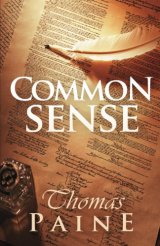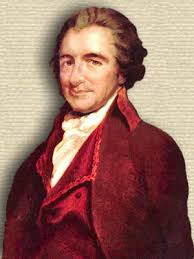Common Sense Page #16
Common Sense is a pamphlet written by Thomas Paine in 1775–1776 advocating independence from Great Britain to people in the Thirteen Colonies. Writing in clear and persuasive prose, Paine marshaled moral and political arguments to encourage common people in the Colonies to fight for egalitarian government.
Put us, say some, on the footing we were on in sixty-three: To which I answer, the request is not now in the power of Britain to comply with, neither will she propose it; but if it were, and even should be granted, I ask, as a reasonable question, By what means is such a corrupt and faithless court to be kept to its engagements? Another parliament, nay, even the present, may hereafter repeal the obligation, on the pretence, of its being violently obtained, or unwisely granted; and in that case, Where is our redress?--No going to law with nations; cannon are the barristers of Crowns; and the sword, not of justice, but of war, decides the suit. To be on the footing of sixty-three, it is not sufficient, that the laws only be put on the same state, but, that our circumstances, likewise, be put on the same state; Our burnt and destroyed towns repaired or built up, our private losses made good, our public debts (contracted for defence) discharged; otherwise, we shall be millions worse than we were at that enviable period. Such a request, had it been complied with a year ago, would have won the heart and soul of the Continent- -but now it is too late, "The Rubicon is passed." Besides, the taking up arms, merely to enforce the repeal of a pecuniary law, seems as unwarrantable by the divine law, and as repugnant to human feelings, as the taking up arms to enforce obedience thereto. The object, on either side, doth not justify the means; for the lives of men are too valuable to be cast away on such trifles. It is the violence which is done and threatened to our persons; the destruction of our property by an armed force; the invasion of our country by fire and sword, which conscientiously qualifies the use of arms: And the instant, in which such a mode of defence became necessary, all subjection to Britain ought to have ceased; and the independancy of America, should have been considered, as dating its æra from, and published by, the first musket that was fired against her. This line is a line of consistency; neither drawn by caprice, nor extended by ambition; but produced by a chain of events, of which the colonies were not the authors. I shall conclude these remarks, with the following timely and well intended hints. We ought to reflect, that there are three different ways, by which an independancy may hereafter be effected; and that one of those three, will one day or other, be the fate of America, viz. By the legal voice of the people in Congress; by a military power; or by a mob: It may not always happen that our soldiers are citizens, and the multitude a body of reasonable men; virtue, as I have already remarked, is not hereditary, neither is it perpetual. Should an independancy be brought about by the first of those means, we have every opportunity and every encouragement before us, to form the noblest purest constitution on the face of the earth. We have it in our power to begin the world over again. A situation, similar to the present, hath not happened since the days of Noah until now. The birthday of a new world is at hand, and a race of men, perhaps as numerous as all Europe contains, are to receive their portion of freedom from the event of a few months. The Reflexion is awful--and in this point of view, How trifling, how ridiculous, do the little, paltry cavellings, of a few weak or interested men appear, when weighed against the business of a world. Should we neglect the present favorable and inviting period, and an Independance be hereafter effected by any other means, we must charge the consequence to ourselves, or to those rather, whose narrow and prejudiced souls, are habitually opposing the measure, without either inquiring or reflecting. There are reasons to be given in support of Independance, which men should rather privately think of, than be publicly told of. We ought not now to be debating whether we shall be independant or not, but, anxious to accomplish it on a firm, secure, and honorable basis, and uneasy rather that it is not yet began upon. Every day convinces us of its necessity. Even the Tories (if such beings yet remain among us) should, of all men, be the most solicitous to promote it; for, as the appointment of committees at first, protected them from popular rage, so, a wise and well established form of government, will be the only certain means of continuing it securely to them. Wherefore, if they have not virtue enough to be Whigs, they ought to have prudence enough to wish for Independance. In short, Independance is the only Bond that can tye and keep us together. We shall then see our object, and our ears will be legally shut against the schemes of an intriguing, as well, as a cruel enemy. We shall then too, be on a proper footing, to treat with Britain; for there is reason to conclude, that the pride of that court, will be less hurt by treating with the American states for terms of peace, than with those, whom she denominates, "rebellious subjects," for terms of accommodation. It is our delaying it that encourages her to hope for conquest, and our backwardness tends only to prolong the war. As we have, without any good effect therefrom, withheld our trade to obtain a redress of our grievances, let us now try the alternative, by independantly redressing them ourselves, and then offering to open the trade. The mercantile and reasonable part in England, will be still with us; because, peace with trade, is preferable to war without it. And if this offer be not accepted, other courts may be applied to. On these grounds I rest the matter. And as no offer hath yet been made to refute the doctrine contained in the former editions of this pamphlet, it is a negative proof, that either the doctrine cannot be refuted, or, that the party in favour of it are too numerous to be opposed. Wherefore, instead of gazing at each other with suspicious or doubtful curiosity; let each of us, hold out to his neighbour the hearty hand of friendship, and unite in drawing a line, which, like an act of oblivion shall bury in forgetfulness every former dissension. Let the names of Whig and Tory be extinct; and let none other be heard among us, than those of a good citizen, an open and resolute friend, and a virtuous supporter of the rights of mankind and of the FREE AND INDEPENDANT STATES OF AMERICA. To the Representatives of the Religious Society of the People called Quakers, or to so many of them as were concerned in publishing the late piece, entitled "The Ancient Testimony and Principles of the People called Quakers renewed, with Respect to the King and Government, and touching the Commotions now prevailing in these and other parts of America addressed to the People in General." The Writer of this, is one of those few, who never dishonours religion either by ridiculing, or cavilling at any denomination whatsoever. To God, and not to man, are all men accountable on the score of religion. Wherefore, this epistle is not so properly addressed to you as a religious, but as a political body, dabbling in matters, which the professed Quietude of your Principles instruct you not to meddle with.
Translation
Translate and read this book in other languages:
Select another language:
- - Select -
- 简体中文 (Chinese - Simplified)
- 繁體中文 (Chinese - Traditional)
- Español (Spanish)
- Esperanto (Esperanto)
- 日本語 (Japanese)
- Português (Portuguese)
- Deutsch (German)
- العربية (Arabic)
- Français (French)
- Русский (Russian)
- ಕನ್ನಡ (Kannada)
- 한국어 (Korean)
- עברית (Hebrew)
- Gaeilge (Irish)
- Українська (Ukrainian)
- اردو (Urdu)
- Magyar (Hungarian)
- मानक हिन्दी (Hindi)
- Indonesia (Indonesian)
- Italiano (Italian)
- தமிழ் (Tamil)
- Türkçe (Turkish)
- తెలుగు (Telugu)
- ภาษาไทย (Thai)
- Tiếng Việt (Vietnamese)
- Čeština (Czech)
- Polski (Polish)
- Bahasa Indonesia (Indonesian)
- Românește (Romanian)
- Nederlands (Dutch)
- Ελληνικά (Greek)
- Latinum (Latin)
- Svenska (Swedish)
- Dansk (Danish)
- Suomi (Finnish)
- فارسی (Persian)
- ייִדיש (Yiddish)
- հայերեն (Armenian)
- Norsk (Norwegian)
- English (English)
Citation
Use the citation below to add this book to your bibliography:
Style:MLAChicagoAPA
"Common Sense Books." Literature.com. STANDS4 LLC, 2024. Web. 26 Nov. 2024. <https://www.literature.com/book/common_sense_270>.




Discuss this Common Sense book with the community:
Report Comment
We're doing our best to make sure our content is useful, accurate and safe.
If by any chance you spot an inappropriate comment while navigating through our website please use this form to let us know, and we'll take care of it shortly.
Attachment
You need to be logged in to favorite.
Log In